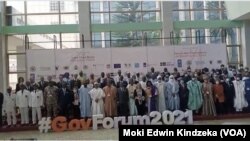Officials from Cameroon, Chad, Niger, and Nigeria have agreed to work together to reconstruct the Lake Chad Basin. The region has been a hotbed of insecurity due to attacks from Islamist terrorist group Boko Haram and its offshoots. The officials met in Cameroon’s capital this week and said the area is gradually returning to normalcy, but unemployment is pushing young people to join militant groups.
Close to 400 representatives of rights groups, funding agencies, United Nations agencies and the African Union met in Yaounde to map out ways of improving living conditions in the troubled Lake Chad Basin.
In a statement, governors from the region said member states and funding agencies will intensify rebuilding and stabilization efforts of the area.
Ahunna Eziakonwa is U.N. assistant secretary general and the regional director for Africa at the U.N. Development Program. She said many of the towns and villages in the Lake Chad Basin need to be rebuilt from the ground up.
“Houses have been destroyed, schools have become nonfunctional, markets, stores destroyed. The rule of law is completely erased with police stations completely destroyed, so a stabilization program tries to rebuild the livelihoods and lives of people who have been affected by first of all making sure we reconstruct those facilities that serve the police for instancem," said Eziakonwa.
Since the death of Boko Haram leader Abubakar Shekau earlier this year, thousands of the group’s fighters have defected or surrendered, according to regional governments and officials of the Multinational Joint Task Force (MNJTF), a regional military alliance fighting the Boko Haram insurgency.
The task force made up of troops from Cameroon, Chad, Niger and Nigeria said attacks by its troops in Boko Haram-controlled areas have made Shekau’s militants weaker.
Richard Fonteh Akum is the executive director of the Institute for Security Studies based in Pretoria, South Africa. He said now is the time to launch sustainable development efforts, while Boko Haram is in apparent decline.
“What may seem as normalcy right now could actually be the silence before another storm of attacks. A few years ago, there was a fracturing within Boko Haram which saw the groups splinter and see the emergence of the Islamic State West Africa Province, but at the same time Boko Haram came out stronger. So, I think unless we have a framework which allows for multi-level peace and stabilization, it will remain extremely challenging to move towards normalcy and effective reconstruction,” he said.
Akum said to stop endemic poverty in the area, roads should be improved for fishers, herders and crop farmers to transport their produce to markets.
The amount of money needed to for rebuilding efforts of the Lake Chad Basin wasn’t disclosed during the meeting, but Cameroon said it will allocate $300 million to spend on infrastructure destroyed by Boko Haram.




